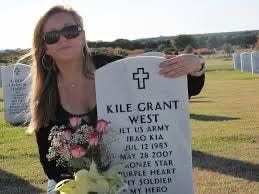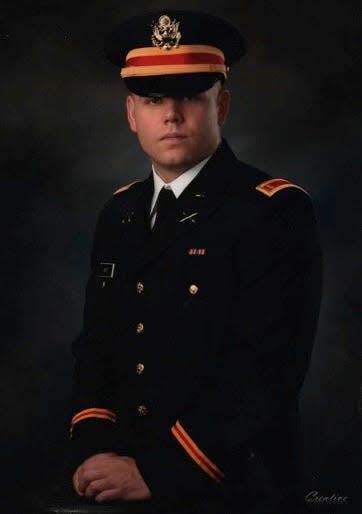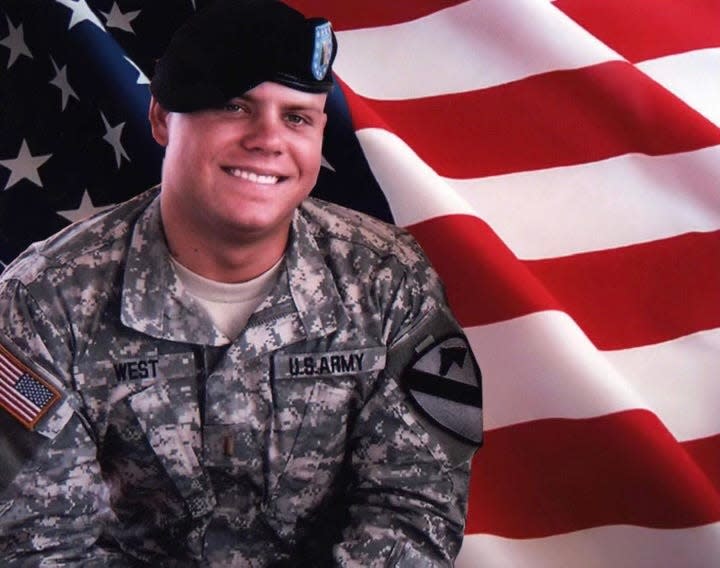Why this Gold Star mom is fighting to hold those funding terrorism accountable

- Oops!Something went wrong.Please try again later.
WASHINGTON — It’s been a long, difficult road for Gold Star mother Nanette West.
There was the searing loss of her son, Army 1st Lt. Kile Grant West, on Memorial Day in 2007 in Iraq. She said he “was born to be a soldier.”
Then, aching from her son's death, West tried to enlist in the U.S. Army but was rejected as “too old.”
Undeterred, the Central Texan, who raised her son in Hutto and now lives in Pflugerville, signed on in another way — as a military contractor working for 2½ years in the same area in Iraq where her son had been.
“I needed to get where he was,” said West, 61, wanting to feel and experience the region where her son died. “I needed to be in his shoes a little bit.”
Kile West, 23, was one of 10 Americans killed on a volunteer mission to help rescue service members who were in an Apache helicopter that had crashed. He was riding in a Bradley Fighting Vehicle on the way to the crash site when it ran over an improvised explosive device, causing it to denote and throwing him from the blast.
“He was due home in two weeks,” Nanette West said. “It’s a lot to process.”

Kile always seemed to have a mission of service, West said, from his time in the ROTC at Stephen F. Austin State University, where he graduated. He was then deployed from Fort Hood (now Fort Cavazos).
Kile was awarded the Bronze Star for heroism and the Purple Heart, and he is buried at the Central Texas State Veterans Cemetery in Killeen.
Now, Nanette West, who did her own investigation into her son’s final days, even riding in a Bradley over the same grounds as he had done, is seeking accountability — a reckoning from those who funded the terrorists who killed Kile.
More: After 80 years, Army keeps promise to WWII airman's family: 'No one left behind.'
To do that, she and other Gold Star families — those who have lost a close family member in the military in the line of duty — and wounded warriors from Iraq and Afghanistan have begun a campaign to get Congress to act. They’re particularly focusing on U.S. Sen. John Cornyn, R-Texas.
Cornyn was the leading force behind the Justice Against Sponsors of Terrorism Act, a 2016 law designed for survivors of the 2001 terrorist attacks and families who lost loved ones to make civil claims against a foreign state for injuries, death or damages from a terrorist act on U.S. soil.
The bipartisan bill, which Cornyn sponsored with then-Sen. Democratic leader Chuck Schumer (the senator from New York is now the majority leader), was the only bill President Barack Obama vetoed for which Congress override the veto.
Obama wanted to preserve the principle of sovereign immunity, which the State Department said protects the U.S. with other nations, but Congress, with a two-thirds vote in both the House and Senate, reversed the president’s veto.
The courts, however, began interpreting the law in different ways, with definitions so narrow on the interpretations of liability that cases could not advance, according to proponents of the bill.

Cornyn and other lawmakers have now stepped in to make clear Congress' intent, and in June he announced a bill with “technical corrections” to the 2016 law and to close loopholes that have prevented lawsuits from being successful.
“The Justice Against Sponsors of Terrorism Act was a monumental step forward in providing families who lost loved ones on Sept. 11, 2001, a path to achieve long overdue closure in a court of law,” Cornyn said when introducing the bill in June.
“By making minor technical edits, this bill makes sure JASTA works the way it was intended to, reaffirms our commitment to holding sponsors of terrorism accountable, and ensures victims’ families can continue to seek justice against those who perpetrated these horrific acts.”
But Gold Star families and wounded warriors, who have sued Iran for funding terrorists in Iraq and Afghanistan under the broader anti-terrorism act that JASTA is a part of, have also run into roadblocks. And they say they are being left out of the corrective language in Cornyn’s bill.
In a letter to Cornyn last month, 250 Texas Gold Star family members, including West, and wounded soldiers from wars in Iraq and Afghanistan told the senior senator from Texas that they needed to be included in his new bill.
“While we have appreciated your past leadership, we write now because legislation you have introduced would deny thousands like us the opportunity to seek justice in U.S. courts against those who knowingly support terrorist organizations,” said the letter.
Cornyn’s bill, they said, would help Americans suing Saudi Arabia — 15 of the 19 airplane hijackers in the 2001 terror attacks were from that country — while the families seeking justice from terrorism sponsors in the Iraq and Afghanistan wars have also been marginalized by court interpretations and don’t want to lose the opportunity to be part of a fix.
Cornyn is sympathetic to the families' situation, telling the American-Statesman, “I’m certainly open to providing relief to Gold Star families.” But that doesn’t mean he wants to amend his technical corrections bill. Instead, he prefers to keep its sole focus on the 2001 terrorist attacks on U.S. soil.
“I'll do anything and everything I can,” he said, to help the Gold Star group. “The question whether it ought to be added to this existing legislation or not, I think is, it's not a clear answer.”

Cornyn's correction bill is narrowly structured to benefit litigants for the 2001 attacks — a grievous moment in U.S. history that left nearly 3,000 dead after terrorists hijacked airplanes and forced them to crash into the World Trade Center in New York and the Pentagon in Washington, and caused an airliner to go down in Shanksville, Pa.
“That makes clear to the courts and to the litigants that Congress did not intend any restriction on the elements of recovery for the 9/11 families,” Cornyn said.
As for relief for the Gold Star families and wounded warriors from the wars in Iraq and Afghanistan, Cornyn said: “I think there's no reason why it has to be attached to this bill. Certainly happy to pursue that separately. And I think there'll be a lot of support for that.”
Gary Osen, a New Jersey-based attorney for about 1,200 Gold Star family members and wounded warriors, said his clients support the fixes for families affected by the 2001 attacks but worry that a similar fix for terrorism cases in Iraq and Afghanistan could be a long time coming.
“We know Congress doesn’t take up statutes like JASTA every day,” Osen said. “As a practical matter, Congress is going to do it only once every couple of years, but it’s encouraging to hear that Sen. Cornyn is generally supportive of addressing this issue.”
More: Austin is one of the best cities in the U.S. for veterans to live in. See where it ranks
'People should be held accountable'
Retired Sgt. Todd Barnum, 38, who used to live in Austin but has moved to Copperas Cove, has had to mark the passage of time. An infantry medic in Iraq, he told the Statesman that he was “blown up” when he was traveling in an armored vehicle that was hit by an explosively formed penetrator in January 2008.
According to his attorneys, Barnum suffered a traumatic brain injury, cognitive dysfunction and chronic hearing loss. And while he insisted on returning to his unit soon after the blast, he later received a 100% disability rating from Veterans Affairs.
Barnum said he is clear on the need for legal recourse: “People should be held accountable.”
West said she feels that the countries, as well as the banks and other entities that have been found to have laundered money and provided support to fund terrorism, “need to be brought to justice.” And thus, without hesitation, she signed the Gold Star group’s letter to Cornyn out of a sense of urgency for recourse.
“As a mom, losing what I’ve lost, even as the years have gone by, it doesn’t go away,” she said. “I felt it was time to do something about it.”
This article originally appeared on Austin American-Statesman: Gold Star mom fights to hold those funding terrorism accountable

